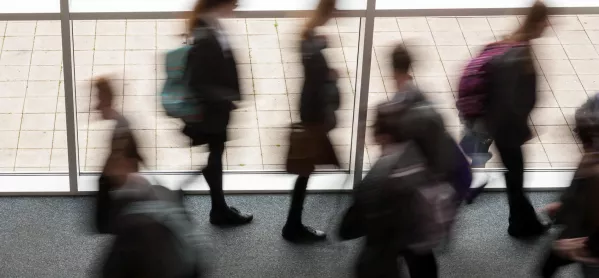Almost half of the country’s local education authority areas face a “looming crisis” over the shortage of secondary school places over the next four years, town hall leaders have warned.
The Local Government Association has today renewed calls for councils to be able to open new maintained schools and to force academies to expand in response to rising pressure for new places.
The LGA claimed that unless more secondary school places were created, 15 council areas will face a shortfall by next year.
Appeals: More parents unhappy with secondary school places
Quick read: One in five miss out on chosen school place
Background: Heads call for national school places strategy
This number will rise to 27 local authority areas in 2021-22, 49 in 2022-23 and 64 in 2023-24, the organisation warned.
By 2024-25, the LGA forecasts that 71 councils, around half of the country’s authority areas, will face not being able to meet demand to provide 123,195 places.
The LGA has called on the Department for Education to use next month’s Spending Round to give councils back the power to open new maintained schools.
Demand for secondary school places
Councillor Anntoinette Bramble, the chair of the LGA’s Children and Young People Board, said: “It makes no sense for councils to be given the responsibility to plan for school places but then not be allowed to open schools themselves.”
The LGA also wants the same powers to direct free schools and academies to expand that they currently hold for maintained schools.
Councils are responsible for ensuring that children are allocated a school place. However, they cannot routinely open new maintained schools to meet demand.
Instead, councils can apply for an academy to be opened in their area.
A council can also expand existing schools in its area or ask academies to expand.
Last year 96,000 new school places were created by councils working with their existing schools, along with free schools and academies. Of these, 37,000 were in secondary schools.
Coun Bramble said: “Despite all the odds, councils have been able to provide desperately needed places for parents looking to secure their child’s place at secondary school in the past year.
“No family should face uncertainty over their child’s school place. But our secondary school places crisis is now just one year away and this will be the reality for thousands of families without action.
“Councils need to be allowed to open new maintained schools and direct academies to expand.”
Tes reported in March this year that many Year 6 pupils were still without an offer of a secondary school place for autumn, despite the official deadline for allocating places having passed.
Some local authorities were said to be struggling to allocate places, with concerns that a spike in the birth rate in the 2000s, which is now making its way through the school system, was having an effect.
Figures published last week showed that the number of parents appealing because they were unhappy with their child’s allocated place in secondary school had increased by 32 per cent over the past three years.
Appeals at secondary school have increased year-on-year from 2015-16 to 2018-19, while primary school appeals have declined, data from the Department for Education showed.
A Department for Education spokesperson said: “We are determined to create more choice for parents when it comes to their children’s education and we have created around 920,000 school places since 2010, and are on track to see that number rise to a million by 2020.
“Local authorities have the power to open new schools, and to create new school places, and must ensure there are enough school places to meet needs locally.”




